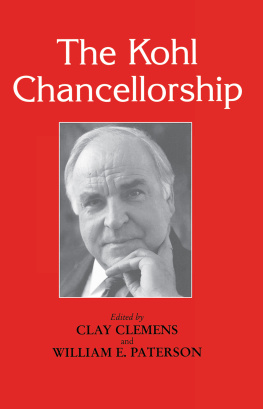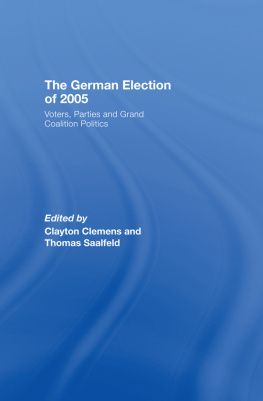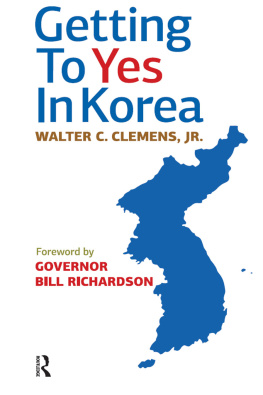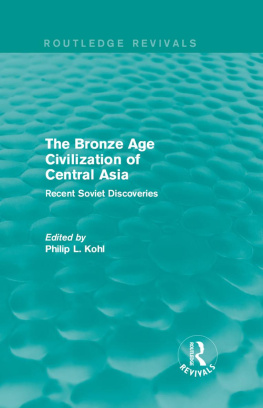THE KOHL CHANCELLORSHIP
BOOKS OF RELATED INTEREST
SUPERWAHLJAHR: THE GERMAN ELECTIONS IN 1994
Edited by Geoffrey K. Roberts
CONSTITUTIONAL POLICY IN UNIFIED GERMANY
Edited by Klaus H. Goetz and Peter J. Cullen
FEDERALISM, UNIFICATION AND EUROPEAN INTEGRATION
Edited by Charlie Jeffery and Roland Sturm
The Kohl Chancellorship
Edited by
CLAY CLEMENS
Government Department, College of William and Mary
and
WILLIAM E. PATERSON
Director of the Insitute for German Studies, University of Birmingham
First published 1998 by
FRANK CASS AND COMPANY LIMITED
Published 2013 by Routledge
2 Park Square, Milton Park, Abingdon, Oxon OX14 4RN
711 Third Avenue, New York, NY, 10017, USA
Routledge is an imprint of the Taylor & Francis Group, an informa business
Copyright 1998 Frank Cass & Co. Ltd
British Library Cataloguing in Publication Data
The Kohl chancellorship
1. Kohl, Helmut, 1930- 2. Prime ministers Germany 3. Germany Politics and
government 19451990 4. Germany Politics and government 1990 I. Clemens, Clay, 1958 II. Paterson, William
943.087092
Library of Congress Cataloging-in-Publication Data
The Kohl chancellorship / edited by Clay Clemens and William Paterson.
p. cm.
This group of studies first appeared in a special issue of German politics, vol. 7, no. 1 (April 1998) T.p. verso.
Includes index.
1. Kohl, Helmut, 1930- . 2. GermanyPolitics and government1945- 3. GermanyHistoryUnification, 1990. 4. Heads of stateGermanyBiography. I. Clemens, Clay, 1958- II. Paterson, William E. III. German politics.
DD262.K65 1998
943.0879dc21
98-15009
CIP
ISBN 13: 978-0-714-64890-3 (hbk)
ISBN 13: 978-0-714-64441-7 (pbk)
This group of studies first appeared in a Special Issue on The Kohl Chancellorship of German Politics, 7/1 (April 1998) ISSN 09644008 published by Frank Cass.
All rights reserved. No part of this publication may be reproduced, stored in a retrieval system, or transmitted in any form, or by any means, electronic, mechanical, photocopying, recording or otherwise without the prior permission of the publisher.
Contents
Clay Clemens
William E. Paterson
Kenneth Dyson
Karl-Rudolf Korte
Clay Clemens
Alistair Cole
Gerard Braunthal
The idea for this volume, and to some extent its contents, originated with the 1997 conference of the United Kingdom Association for the Study of German Politics, held in conjunction with the Institute for German Studies at the University of Birmingham. That session was devoted entirely to an assessment of Chancellor Helmut Kohls leadership and legacy. Several papers presented there appear in this collection.
The editors would therefore like to express their sincere gratitude to participants at the conference, but above all to two individuals who played a key role in planning it: Dr Charlie Jeffery, Deputy Director of the Institute for German Studies at the University of Birmingham, and Professor Karl Koch, Chairman of the United Kingdom Association for the Study of German Politics.
CLAY CLEMENS1
When Helmut Kohl first became chancellor in late 1982, not even ardent supporters imagined that he would still hold the office more than 15 years later. Yet Germanys 1998 federal election saw him once again running as an incumbent. This very longevity has hampered efforts to evaluate his record: unless clearly stamped provisional, such assessments especially those from the 1980s that belittled his impact and confidently foresaw an imminent succession soon looked ludicrously premature. Moreover, many early appraisals of Kohl call to mind the old fable about six blind men identifying an elephant: many dismissed him as slow, even lumbering, albeit when impatient or panicked by a tiny pest prone to trumpet angrily, charge blindly and wreak havoc, while others stood in awe of his massive power, thick skin, great endurance, shrewd instincts and uncanny sense of direction.
Putting together this volume has thus required caution. Enough of the Kohl era has passed to permit some fairly firm assessments of its record, but we have also carefully considered how any conclusions might appear several years hence. Likewise, while each contributor addresses a specific aspect of Kohls style or impact, all have observed him from various angles over many years and thus avoid the mistake of judging this entire political animal based on just one quality.
The following, brief overview suggests key elements of Kohls leadership style that help explain his longevity and success; several later articles examine each of these elements in greater detail. An effort is also made here to outline Kohls record, both in the politics of his time and in a more lasting legacy his impact on Germany.
VISIONARY OR VIRTUOSO OF POWER PRESERVATION?
It might appear that Helmut Kohl grew in office. The party politician who in 1982 narrowly unseated his popular predecessor through Bonns first successful no-confidence vote and became a target of jokes about sitting out decisions seemed a far cry from the colossus who thereafter bestrode German politics routinely receiving near-unanimous confirmation as CDU chair, bringing his coalition four straight federal election wins, and masterminding national unity while pressing for European Union. Yet appraisals of Kohl changed more dramatically than did his leadership style, which despite fluctuating fortunes remained strikingly constant.
Early on, even few loyal allies considered him a visionary. While in opposition, he had promised Germans a moral-spiritual renewal, but it never took concrete form his immersion in party politics seemed to expose such lofty pledges as empty rhetoric. Kohl did trust in the eternal verities family, Heimat, hard work, solidarity but could rarely galvanise others behind them. For years, as Karl Korte shows, a pragmatic focus on the doable shaped his operational approach to the German question; thus, despite genuinely seeing his nations right to unity as just, he did not offer a vision for achieving it until circumstances created an unexpected, dramatic opportunity in late 1989 (and even then his Ten Point Plan aimed more to restrain events than propel them).
As William Paterson emphasises, Kohls true dream was broader: gaining political consciousness amid the ruins of war gave him an unshakeable belief in a need to contain nationalism within an over-arching sense of common European values. This youthful idealism, fed by Adenauers integration policies, never faded. As chancellor, Kohl pressed, chided and cajoled fellow heads of government to set aside differences and gradually strengthen the Communitys complex decision-making institutions. He needed partners, and long had one in Francois Mitterrand, but pushed on largely alone in the 1990s, becoming so closely vital to movement toward political union and as Kenneth Dyson emphasises a common currency, that mere rumours of his ill-health could rattle financial markets around Europe.
Yet taking the desirability of integration, and his countrys traditional support for it, as givens, Kohl could rarely articulate this case in ways that made the EU alphabet soup of programmes and their price appetising to taxpayers, especially those of a more nationally oriented mindset. As Paterson points out, lack of rhetorical and public relations skill potentially handicapped him in selling ideas or winning over converts. Kohl addressed that problem in part by hiring good speechwriters, but had this European vision been his sole leadership asset, he might not have lasted.












